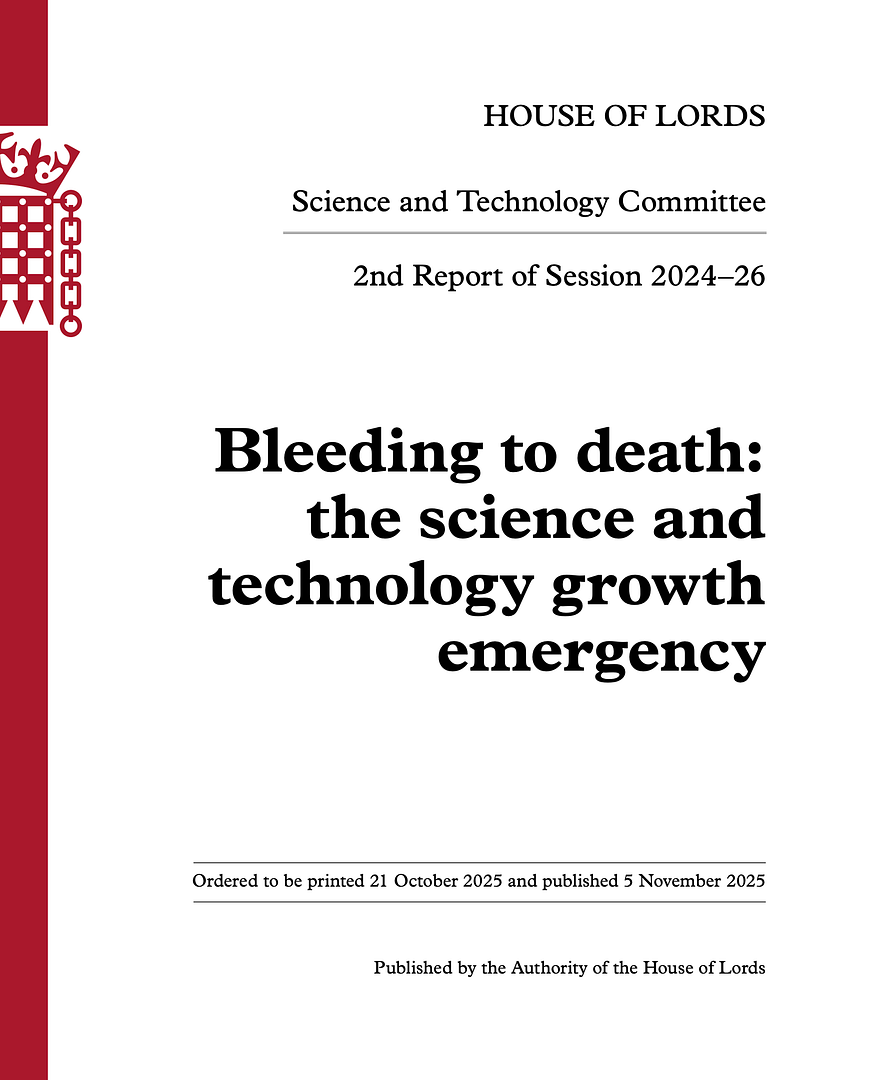UK Science Commercialisation: Why the UK Still Bleeds Its Best Science Overseas — And How We Fix It
UK science commercialisation has always had a touch of tragicomedy about it. We do the hard part brilliantly — the blue-sky thinking, the elegant experiment, the breakthrough paper. Then, just as things start to look commercially interesting, we hand it over to someone else to make the money. The Americans scale it, the Norwegians finance it, and we sit around wondering what went wrong — again.
The House of Lords Science and Technology Committee report spells out what many of us have known for years: we don’t have a shortage of ideas — we have a shortage of nerve. Our system is designed to minimise embarrassment, not maximise impact. That’s why so many spin-outs either drift abroad or get quietly absorbed into someone else’s balance sheet.
The Problem with UK Science Commercialisation Isn’t Capital — It’s Culture
Every few years, a minister or think tank promises to “close the scale-up gap.” They talk about pension funds, risk capital, and industrial strategies. But the real issue isn’t just money — it’s mindset. Britain’s institutional DNA is cautious. We admire the maverick in theory, then quietly dismantle their project in committee.
I’ve seen this up close — in startups, in government programmes, and in boardrooms where innovation is an agenda item rather than a reflex. The fear of failure runs so deep that success becomes suspect. The Born to Disrupt mindset — taking risks, learning from failure, improvising your way through chaos — simply doesn’t fit the bureaucratic mould we’ve built around our science.
“The biggest problem in the Treasury and the biggest problem for Government as a whole is that you are crucified for failure, and nobody gives a monkey’s about success.”
That quote from the Lords’ evidence sessions sums it up. In the UK, we treat experimentation as a liability. In Silicon Valley, it’s a credential. That cultural divergence explains why our breakthroughs so often become someone else’s billion-dollar industry.
So How Do We Fix It?
It’s tempting to think in mechanical terms — build a new council here, merge a few funds there, tweak the spin-out ratios. And yes, the report calls for exactly that: a national science and technology council, better coordination, friendlier university policies, and a bit more pension money in the mix.
But real change won’t come from a better spreadsheet. It’ll come when we stop treating risk as a reputational hazard and start seeing it as the price of progress. We need leaders — in government, universities, and finance — who are willing to take a few bruises in pursuit of something worth building.
- Back founders, not frameworks. Create room for individuals to take responsibility — and take credit — for bold bets.
- Use procurement as propulsion. Government can be a customer, not a critic. Buy British innovation early, even if it isn’t perfect yet.
- Fix university spin-outs. If an academic can’t make more money from building a company than publishing a paper, we’ve lost before we’ve begun.
- Unleash pension funds. There’s more than enough domestic capital — it’s just locked behind spreadsheets and compliance departments.
- And above all, celebrate the misfires. Every failure that teaches something is worth more than ten risk-free reports that go nowhere.
From Playing It Safe to Playing for Keeps
The future of UK science commercialisation depends on whether we can learn to live with a bit of discomfort. Risk, after all, is just another word for learning in public. Until we build a culture that prizes ambition over anxiety, we’ll keep inventing the future — and then exporting it to whoever has the guts to fund it.
As I wrote in Born to Disrupt, the difference between a band that never leaves the garage and one that headlines Glastonbury isn’t talent — it’s momentum. The same applies to innovation. We don’t lack the riffs or the ideas. We just keep pulling the plug before the encore.
Read the full report:
Science, Technology and Innovation in the UK Economy — House of Lords Science and Technology Committee (October 2025)
.
Tags: #UKScienceCommercialisation #InnovationPolicy #ScaleUp #HouseOfLords #RiskAversion #BornToDisrupt #TimHarper


